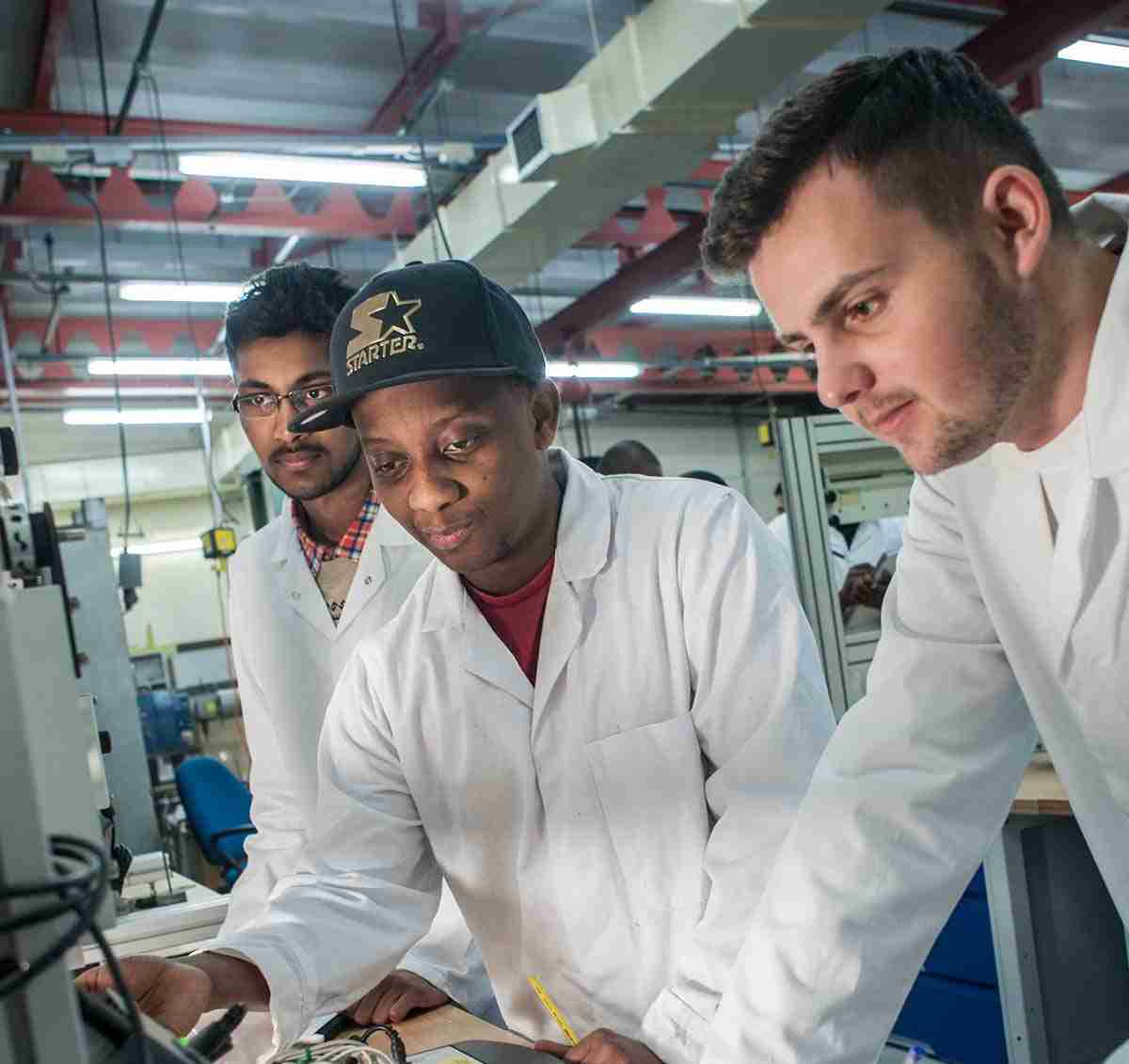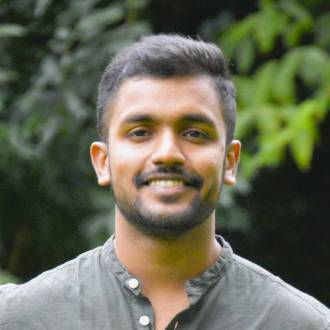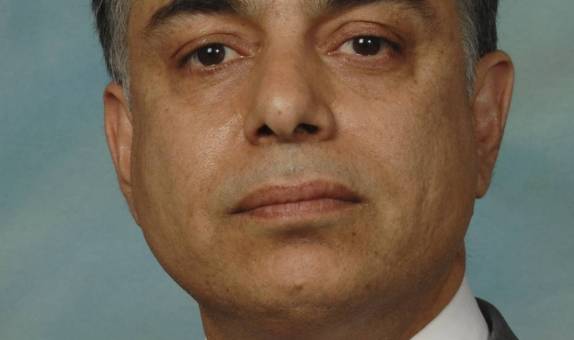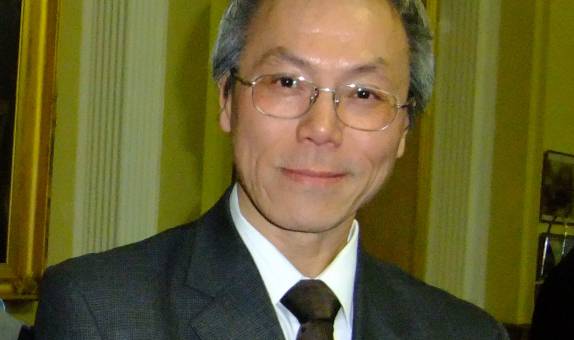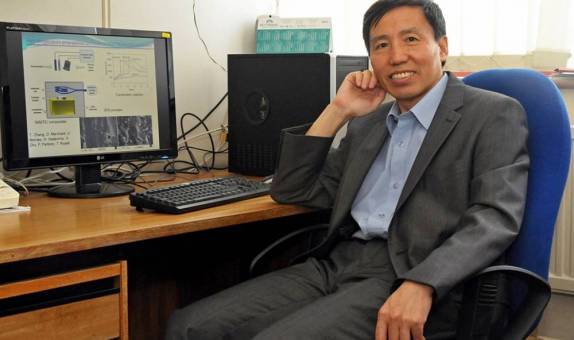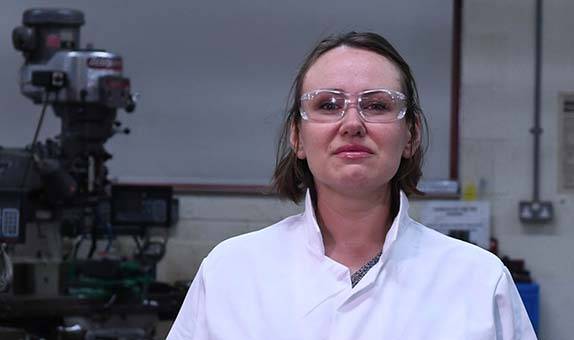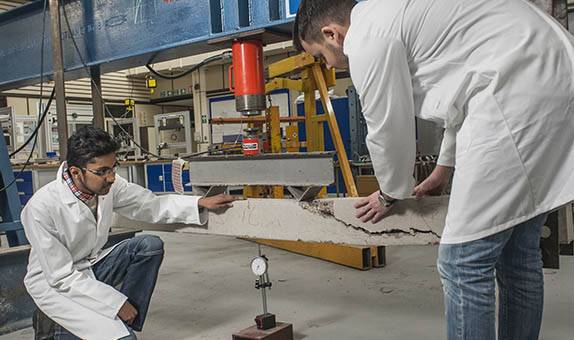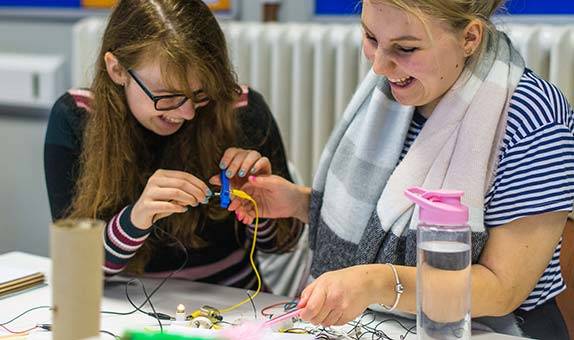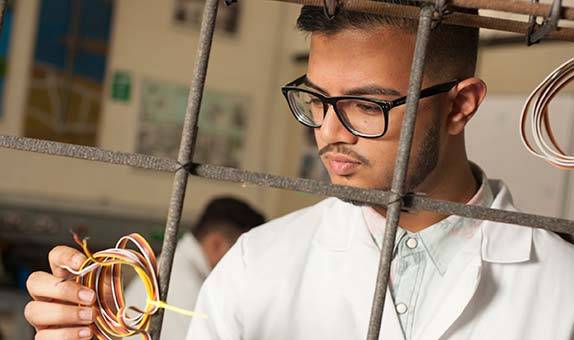Advanced Product Design Engineering & Manufacturing MSc
Why choose this course?
This course examines the latest developments in digital product development and manufacturing. You will gain hands-on experience of the latest Computer Aided Design and Computer Aided Manufacturing applications, including 3D modelling techniques, 3D laser scanning, model reconstruction, 3D printing and Computer Numerical Control Machining.
You will also gain knowledge and experience in analytical Computer Aided Engineering design tools to assist the product validation process by applying advanced design simulation and finite elements analysis techniques. Through an individual project, you will be able to extend your knowledge in a field of your choice, establishing yourself as a specialist.
| Mode | Duration | Attendance | Start date |
|---|---|---|---|
| Full time | 1 year | Delivered in one-week blocks | September 2024, January 2025 |
| Full time | 2 years including professional placement | Delivered in one-week blocks plus professional placement | September 2024, January 2025 |
| Part time | 2 years | Delivered in one-week blocks | September 2024, January 2025 |
| Main location | Roehampton Vale |
Reasons to choose Kingston University
- You will use the latest CAD/CAM/CAE computing technology at all stages, from design and testing to manufacture.
- The experience you gain will be hands-on laboratory-based experience and directly relevant to your future working environment.
- The course meets the requirements for Further Learning for a Chartered Engineer (CEng) if you already have an Accredited CEng (Partial) BEng (Hons) or an Accredited IEng (Full) BEng/BSc (Hons).
Accreditation
Accredited by the Institution of Mechanical Engineers (IMechE) on behalf of the Engineering Council.
The MSc will meet, in part, the academic benchmark requirements for registration as a Chartered Engineer. Accredited MSc graduates who also have a BEng (Hons) accredited for CEng, will be able to show that they have satisfied the educational base for CEng registration.
It should be noted that graduates from an accredited MSc programme, who do not also have an appropriately accredited honours degree, will not be regarded as having the exemplifying qualifications for professional registration as a chartered engineer with the Engineering Council; and will need to have their first qualification individually assessed through the individual case procedure if they wish to progress to CEng.
- Further learning details are available on the Institution of Mechanical Engineers website
- All accredited degrees are displayed on the Institution of Mechanical Engineers website
Accreditation is a mark of assurance that the degree meets the standards set by the Engineering Council in the UK Standard for Professional Engineering Competence (UK-SPEC). Some employers recruit preferentially from accredited degrees, and an accredited degree is likely to be recognised by other countries that are signatories to international accords. Please check the Engineering Council website for more information.
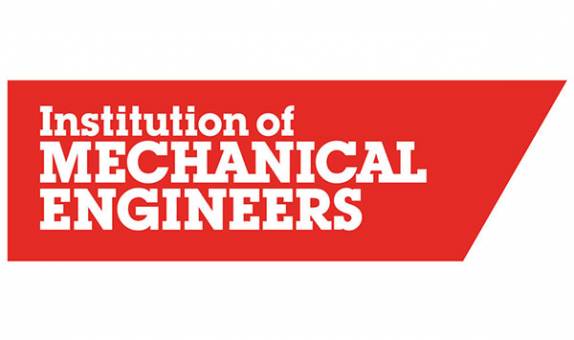
Institution of Mechanical Engineers
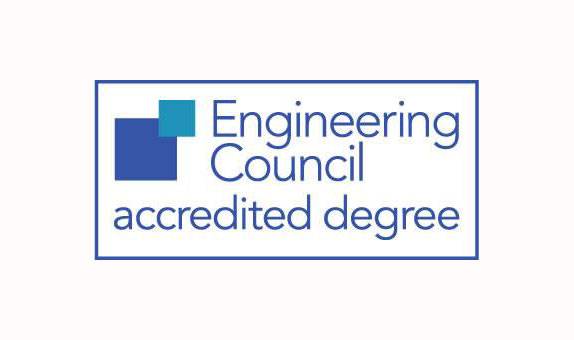
Engineering council
What you will study
This programme is structured to provide you with the latest developments in this still-evolving discipline of digital product development. It focuses on providing you with hands-on experience of the latest computing applications throughout the entire product development cycle, from simple 3D modelling techniques to an extended capability of 3D laser scanning to generate complex Class A surfaces.
CAE 3D printing
Students also gain practical and theoretical knowledge of analytical design tools to assist the product validation process by applying advanced mechanism design simulation and finite elements analysis techniques. Additionally, examines the importance of advanced manufacturing techniques and the methods used to integrate Computer Aided Manufacturing CAM with computer numerical control, 3D printing technologies into product data management PDM.
Additionally, the programme enables you to gain the entrepreneurship, management and business skills necessary to take on leadership roles in major product design engineering projects.
The hands-on approach, using our state-of-the art multidisciplinary laboratories with state-of-the-art equipment from 3D Printing, CNC machining, Laser Scanning, Metrology, Materials Testing and many more, is a valuable part of the course. The course dovetails with research activities of the teaching staff, implementing the latest advances in our research. Utilising applied research, you have the opportunity to do your own research within an individual industry-relevant 'capstone' project. This includes preparation of a scientific paper, providing an opportunity for that first breakthrough into publishing your work.
Students will be required to pass every module to then go on placement. It is the responsibility of individual students to find a suitable paid placement. Students will be supported by our dedicated placement team in securing this opportunity.
Modules
Professional placement
Core modules
Quality Management Systems
15 credits
To ensure that products and services have the quality they have been designed for, a quality strategy throughout the organisation is required. This approach to the management of quality throughout the entire organisation has evolved to what is generally known as Quality Management Systems (QMS). The focus of this module is to inform students about the fundamental principles of QMS and its implementation using various tools and techniques.
This module will start off with an overview of QMS with an emphasis on ISO 9000 series, which is a key building block in an organisation's approach to total quality management (TQM) and strategic process improvement (SPI). This will lead to the next topic which is the selection of tools and techniques, and the typical problems found in their use and applications. The final part of this module will cover key concepts of specific quality management techniques such as quality function deployment (QFD), design of experiments (DoE), failure mode and effects analysis (FMEA), statistical process control (SPC), benchmarking, business process re-engineering (BPR). value stream mapping (VSM) and Six Sigma. All these will be vital in enhancing the your employability skills, especially if you're interested in working in quality management sectors.
Integrated Engineering Simulation
15 credits
This module is structured to enable you to develop an in-depth understanding of some of the fundamental CAE computing technologies that support the engineering product development process.
Advanced CAD/CAM Systems
15 credits
This module covers advanced CAD and CAM techniques in conceptual design and manufacture and is heavily focussed on rapid manufacturing methods involving mould design, machining tool path optimisation and full machining simulation verification, and machining collision avoidance subjects will also be covered.
Product Design Lifecycle Analysis
30 credits
This module is structured in a way to enable you to develop an understanding of the different stages in the lifecycle of a designed product, from inception, through to design and manufacturing, then into service and finally retirement. This module aims to help you develop an understanding of these stages in a product lifecycle and the processes that need to be undertaken in these stages and their interrelationships. This module will also aim to help you develop a fundamental understanding of product lifecycle from a business and organisational perspective. Case studies are used to illustrate the application and relevance of taught concepts. You will be asked to work in a team to perform a comprehensive product lifecycle analysis, using the knowledge learnt in this module as well as applying the knowledge acquired in pre-requisite modules.
Research Techniques, Innovation and Sustainability
30 credits
Research Techniques, Innovation and Sustainability equips you with the skills and knowledge required to select and justify a research topic and then to plan and execute that research project. Research is a broad topic covers a variety of activities that range from undertaking a project as part of an academic programme, through research and development in the commercial environment, to acquiring information to inform projects undertaken as part of routine business practice. This module introduces research in these contexts and allows you to develop your own research plan. As part of the module, you will consider setting research questions and determining hypotheses, acquire relevant information and data, apply suitable analytical techniques, and evaluate the significance and potential applications of their research findings. You will also develop your innovation skills through a combination of workshops and team working, resulting in submission of an innovation proposal aimed to address UN Sustainable Development Goal 11, Sustainable Cities and Communities.
The module covers many practical aspects surrounding research in the commercial environment including intellectual property and professionalism, and sustainability is embedded throughout the module both in course content and via development of the innovation proposal.
Dissertation
60 credits
Drawing on previous knowledge and experience, the dissertation module allows you to study an area of interest within your chosen field in significant depth. In undertaking the dissertation, you will develop not only a deeper understanding of your subject area but will also be able to demonstrate a high level of autonomy in terms of project dissertation planning and management. You will be able to demonstrate knowledge and competence in reviewing existing published literature and data and, through your own efforts, apply one or more of a range of research methods to collect and analyse data and draw well-founded conclusions as a result of your research. The main output from the module is a final report but the option is available for you to prepare their work in the format of an article suitable for submission to a relevant conference or journal.
Optional modules (choose one)
Advanced Product Modelling
15 credits
This module is structured in a way to develop an in-depth understanding of computer-aided design techniques such as solid and surface modelling that can support the development of engineering products. This module also aims to help you develop a fundamental understanding of the role of these technologies within a Product Lifecycle Management (PLM).
Industrial Robotics
15 credits
This module provides high level view on the design of mechatronic and automation systems. Applications and types of such systems are discussed. Main components of mechatronic design are introduced, including mechanical design through specialised software, sensors and actuators, control design, and software development for real-time implementation. Theoretical material is illustrated by practical laboratory sessions on real-time design, using industrial standard, state-of-the-art equipment. A range of transferable skills gained in this module is aimed to help with your work on your final project and extra-curricular activities available within the school.
Professional placement
Professional Placement
120 credits
The Professional Placement module is a core module if you're following a masters programme that incorporates an extended professional placement. It provides you with the opportunity to apply your knowledge and skills in an appropriate working environment, and develops and enhances key employability and subject specific skills in your chosen discipline. You may wish to use the placement experience as a platform for a major project or your future career.
It is your responsibility to find and secure a suitable placement opportunity; this should not normally involve more than two placements which must be completed over a minimum period of 10 months and within a maximum of 12 months. The placement must be approved by your Course Leader prior to commencement to ensure its suitability. You will have access to the standard placement preparation activities offered by the Student Engagement and Enhancement (SEE) group.
Read more about the postgraduate work placement scheme.
Please note
Optional modules only run if there is enough demand. If we have an insufficient number of students interested in an optional module, that module will not be offered for this course.
What our students say
Work placement scheme
Many postgraduate courses at Kingston University allow students to take the option of a 12-month work placement as part of their course. Although the University supports students in finding a placement and organises events to meet potential employers, the responsibility for finding the work placement is with the student; we cannot guarantee the placement, just the opportunity to undertake it. You may find securing a professional placement difficult as they are highly competitive and challenging, but they are also incredibly rewarding. It is very important to prepare and apply yourself if this is the route you wish to take. Employers look for great written and oral communication skills and an excellent CV/portfolio. As the work placement is an assessed part of the course, it is covered by a student's Student Route visa.
Find out more about the postgraduate work placement scheme.
Entry requirements
Teaching and assessment
The assessment strategy is designed to support your learning experience. Assessment criteria are clear, transparent and explicit and the scope of each assessment is discussed with students within modules. The course employs a combination of assessment methods will be used throughout the course. These elements include module assignments, module examinations, in-class tests, experiment reports, industrial visit reports, seminars, verbal presentations and the project dissertation.
Each module leader is responsible for ensuring that the method of assessment reflects the aims and learning objectives of the module, is demanding and stimulating and at the appropriate master level. Formative assessments are embedded into the delivery pattern of all the modules and are designed to help students learn more effectively by giving them feedback to improve their performance and feedforward towards summative assessments. Reflective practice by students and feedback from designated Personal tutors will also form part of the formative assessments. Group activities are an important part of the course teaching and assessment strategy where students learn and improve through peer feedback.
The individual project provides a challenge to the candidate to undertake a real world problem because most projects are industrially orientated. Students will be given close guidance to select a project which is relevant to the chosen field. During the project, the student will be expected to apply the knowledge learnt during the course to achieve agreed deliverables, whilst satisfying any given constraints. Key skills in communication, presentation, literature search, problem analysis, project planning, report writing and solution justification are all part of the learning objectives defined in the field.
Coursework are mainly submitted electronically on the CANVAS of each module. You are reminded of the faculty policy for the late submission of coursework. Any work submitted up to a week late will be capped at minimum 50%, anything submitted later than this will receive a zero mark.
Who teaches this course?
The course is taught by the Department of Mechanical Engineering. Staff have a wide range of experience across research and industry and continue to practise and research at the cutting edge of their discipline. This ensures that our courses are current and industry-informed, ensuring you get the most relevant and up-to-date education possible.
The Department has strong links with industry leaders, including Delphi, Lotus Engineering, MAN and Thales. Many of our innovative, hands-on projects involve students as well as academics and receive national and global coverage.
Our applied approach to teaching is supported by dedicated laboratories for mechanical, automotive and motorsport engineering, including wind tunnels, state-of-the-art rapid prototyping and manufacturing machinery, a fully-equipped materials lab, engine test cells, an automotive diagnostics lab featuring the latest industrial software packages, and a modern electronics/robotics lab with the recent addition of a robot and electronic equipment from National Instruments.
Our courses encompass applications from all areas of engineering, providing our students with the knowledge and flexibility they need to work across many industries, both in the UK and overseas.
Postgraduate students may run or assist in lab sessions and may also contribute to the teaching of seminars under the supervision of the module leader.
Our modern teaching environment
There is a wide range of facilities for practical work at our Roehampton Vale campus, where this course is based. You will have access to a modern environment with the latest technology, including:
- large-scale wind tunnels that enable testing in winds of up to 90 miles per hour
- engine-testing facilities, plus several display engines, such as a V6 Ford Cosworth and a 3-cylinder orbital direct injection engine
- industry-standard test and experimental equipment for metrology, robotics, rapid prototyping, fatigue and quality control.
We also have a dedicated postgraduate workroom with high spec PCs and a range of software. Computer-aided design facilities include:
- a range of CAD/CAM packages, such as Ideas, SolidWorks and AutoCad
- finite element analysis
- computational fluid dynamics
- virtual instrumentation.
Fees for this course
Additional costs
Depending on the programme of study, there may be extra costs that are not covered by tuition fees which students will need to consider when planning their studies. Tuition fees cover the cost of your teaching, assessment and operating University facilities such as the library, access to shared IT equipment and other support services. Accommodation and living costs are not included in our fees.
Where a course has additional expenses, we make every effort to highlight them. These may include optional field trips, materials (e.g. art, design, engineering), security checks such as DBS, uniforms, specialist clothing or professional memberships.
Careers and recruitment advice
The Faculty has a specialist employability team. It provides friendly and high-quality careers and recruitment guidance, including advice and sessions on job-seeking skills such as CV preparation, application forms and interview techniques. Specific advice is also available for international students about the UK job market and employers' expectations and requirements.
The team runs employer events throughout the year, including job fairs, key speakers from industry and interviews on campus. These events give you the opportunity to hear from, and network with, employers in an informal setting.
After you graduate
The course offers you computing, entrepreneurship, management and business skills for taking on leadership roles to tackle major product design engineering projects.
What our graduates say
How the engineering staff work with industry partners
Our excellent industrial links have developed over many years and throughout many countries. Some examples include work with:
- Matra-Marconi Space Ltd;
- Ericsson;
- Balfour Beatty;
- The National Health Service; and
- British Gas.
Our Industrial Advisory Committee reviews and advises industrial activities. The Committee acts as a forum for discussing teaching, research and consultancy to industry.
Benefits from this course
Throughout this course, you will benefit from:
- outside speakers who will keep you informed of the latest developments in industry;
- hands-on experience and workshops to back up the theory; and
- the chance to work on industrially-orientated projects.
What this course offers you
- This course addresses how to use the latest computing technology at all stages of the design process. You cover the entire cycle from design to manufacture, plus the potential constraints.
- It will develop your professional, analytical and management skills, as well as improving your technical skills and knowledge. For example, you will gain communication, teamwork, IT and problem-solving skills.
- Each module combines a stimulating mix of lectures, practical laboratory work, group work, case studies and presentations. You can directly transfer the hands-on experience in many technical modules to your working environment.
- Your MSc project allows you to build on your academic knowledge and extend your in-depth knowledge in your area of specialisation. It can be an excellent selling point when looking for a job or promotion.
- Input from industry experts complements the academic teaching throughout the course.
- You can choose to study the course full-time or part-time to fit in with work commitments. September and January start dates give you extra flexibility.
- We regularly review all our postgraduate courses to make sure that they are up-to-date, reflect industry needs and are comparable to other university courses.
Research areas
Engineering research
Many academic staff are engaged in a range of research and consultancy activities funded by the Research Councils, the European Union, the government, trade unions and industry. These activities ensure our staff are in touch with the latest industry thinking and bring best practice to your studies.
Research centres
Research in the faculty is organised into three research centres, which provide focus and encourage the cross-fertilisation of ideas.
- the Applied Engineering Research Centre looks at applied engineering, manufacturing and material processing topics;
- civil engineering research in the Sustainable Technology Research Centre includes land use, re-cycling waste materials and efficient energy use; and
- the Aerospace Research Group specialises in space activities ranging from electric propulsion and planetary robotic exploration to in-orbit servicing technology development.
Find out more about our research seminars in the Events and lectures section.
Extra activities for this course
There are always interesting activities taking place at Kingston and exciting opportunities to take advantage of.
Our lively research culture is reflected in our regular seminars. Recent examples include:
- International Conference on Autoclaved Aerated Concrete
- Recent Advances in the Micromechanics of Ductile Fracture
- Environmental Degradation in Adhesively Bonded Structures
- Modelling of Deformation and Failure of Polymers: Why is Bridging of Length and Time Scales Necessary?
- Why Bolt It When You Can Bond It? The Gluing Evolution.
Course changes and regulations
The information on this page reflects the currently intended course structure and module details. To improve your student experience and the quality of your degree, we may review and change the material information of this course. Course changes explained.
Programme Specifications for the course are published ahead of each academic year.
Regulations governing this course can be found on our website.


